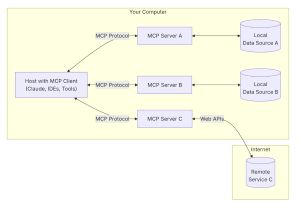News
AWS Embraces Model Context Protocol for Agentic AI Development
Amazon Web Services (AWS) is embracing the Model Context Protocol (MCP) in its developer tooling, helping agentic AI software development where autonomous agents can complete complex tasks without constant human intervention.
The GitHub repo for the open-source Model Context Protocol, created by major AI player and AWS partner Anthropic, describes it as "An open protocol that enables seamless integration between LLM applications and external data sources and tools." In a nutshell, it provides a structured way for AI models to seamlessly connect with and utilize external tools, data sources, and services, thereby enabling more capable and integrated AI applications, particularly in the realm of agentic AI.
Since it was introduced in November 2024 by Anthropic, the MCP has gained much traction in the industry, with adopters including fellow cloud giant Microsoft, which yesterday announced a partnership with Anthropic to create an official C# SDK for MCP.
AWS, meanwhile, is embracing the MCP on several fronts, with a new video titled Coming soon: MCP support in Amazon Q Developer CLI proclaiming "we are excited to pre-announce MCP Model Context Protocol support for Amazon Q CLI," referring to the AI-powered coding assistant's command-line option.
On the same day (April 1), AWS also introduced AWS MCP Servers for code assistants, a suite of specialized MCP servers that bring AWS best practices directly to development workflows.
"What if your AI assistant could instantly access deep AWS knowledge, understanding every AWS service, best practice, and architectural pattern?" that post said. "With MCP, we can transform general-purpose LLMs into AWS specialists by connecting them to specialized knowledge servers. This opens up exciting new possibilities for accelerating cloud development while maintaining security and following best practices."
Specific highlights of the AWS MCP Servers as presented by the company include:
- Enforce AWS best practices automatically: Write well-architected code from the start with built-in security controls, proper observability, and optimized resource configurations
- Cut research time dramatically: Stop spending hours reading documentation. Our MCP Servers provide contextually relevant guidance for implementing AWS services correctly, addressing common pitfalls automatically.
- Access ready-to-use patterns instantly: Use pre-built AWS CDK constructs, Amazon Bedrock Agents schema generators, and Amazon Bedrock Knowledge Bases integration templates that follow AWS best practices from the start.
- Optimize cost proactively: Prevent over-provisioning as you design your solution by getting cost-optimization recommendations and generating a comprehensive cost report to analyze your AWS spending before deployment.
"Our specialized AWS MCP Servers combine deep AWS knowledge with AI capabilities to accelerate development across key areas," AWS said. "Each AWS MCP Server focuses on a specific domain of AWS best practices, working together to provide comprehensive guidance throughout your development journey."
You can learn more in the AWS MCP Servers GitHub repo. Servers listed there include:
- Core MCP Server
- AWS Documentation MCP Server
- Amazon Bedrock Knowledge Bases Retrieval MCP Server
- AWS CDK MCP Server
- Cost Analysis MCP Server
- Amazon Nova Canvas MCP Server
A related post on the same day details how to Harness the power of MCP servers with Amazon Bedrock Agents.
"Developed by Anthropic as an open protocol, MCP provides a standardized way to connect AI models to virtually any data source or tool," that post said. "Using a client-server architecture, MCP enables developers to expose their data through lightweight MCP servers while building AI applications as MCP clients that connect to these servers. Through this architecture, MCP enables users to build more powerful, context-aware AI agents that can seamlessly access the information and tools they need. Whether you're connecting to external systems or internal data stores or tools, you can now use MCP to interface with all of them in the same way. The client-server architecture of MCP enables your agent to access new capabilities as the MCP server updates without requiring any changes to the application code."
Here's that architecture:
 [Click on image for larger view.] MCP Architecture (source: AWS).
[Click on image for larger view.] MCP Architecture (source: AWS).
"Today, MCP is providing agents standard access to an expanding list of accessible tools that you can use to accomplish a variety of tasks," AWS said. "In time, MCP can promote better discoverability of agents and tools through marketplaces, enabling agents to share context and have common workspaces for better interaction, and scale agent interoperability across the industry."
An AWS community post, part of the April 1 blitz, explained Running MCP-Based Agents (Clients & Servers) on AWS with a Java focus.
That post explains how MCP helps developers save time by providing a number of ways to integrate external data and systems into agents and AI applications to make it easier for developers to create and consume the integrations. "For Agents to be successful accomplishing a task like 'schedule an appointment to adopt a dog' or 'add a feature to my code so that users can schedule dog adoption,' they need access to things outside of the AI," it said. "There have been ways to wire these integrations into Agents (tools, function calling, etc) but for developers there was often tedious work involved in creating those integrations."
Stay tuned to see how the MCP evolves in the future in the AWS and Azure clouds and elsewhere.
About the Author
David Ramel is an editor and writer at Converge 360.